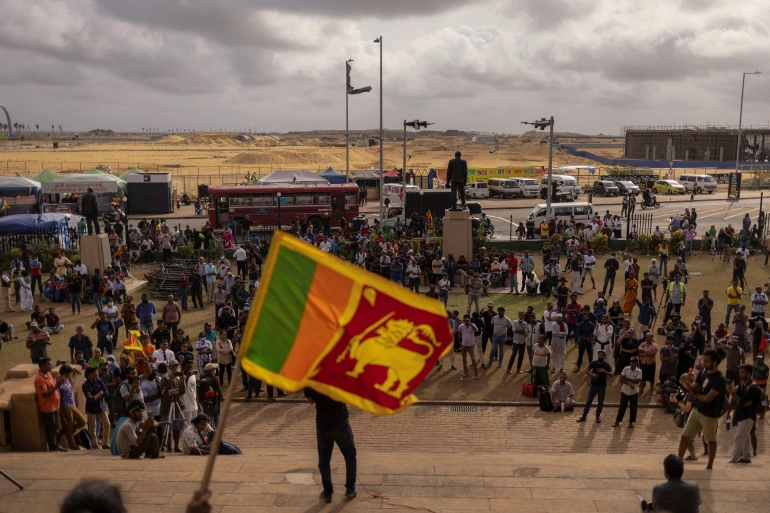Sri Lanka’s police said the forcible eviction of protestors from the Presidential Secretariat was because authorities could not take their word that the building would be vacated the next day as promised as President Ranil Wickremesinghe has come under international fire.
“They said on different occasions giving us different dates saying they will vacate the place,” Police spokesman Nihal Thalduwa told reporters.
“But we were at a place where we couldn’t trust them anymore. That is why the Tri-forces and the STF removed these members of an illegal gathering from the place. This is government property. They do not have the permission to force themselves in and stay there.”
“And a new President was sworn in. For him to take on his duties and carry out his duties, he doesn’t have a place yet. He gave the oath in Parliament because the president’s palace, Prime Minister’s office and the temple trees all cannot resume duties yet.
“It is an office for public benefit. Therefore, it is our duty to vacate the place.”
Protestors had said they told Fort Police that would move out. The day before the eviction, protestors were seen removing banners and other materials from the building.
Protestors had also moved out of the Presidential Palace and Temple Trees as publicly declared earlier.
At least nine persons were admitted to the hospital after the pre-dawn raid.
The attack had brought international condemnation while comparisons were made with the actions of the previous president. Senior monk Omalpe Sobitha said such an event had not even happened under ousted President Gotabaya Rajapaksa.
“We are alarmed by the unnecessary use of force reportedly employed by Sri Lanka’s security forces to break up a protest camp near presidential offices in Colombo – only hours before the protesters indicated that it was due to be dismantled,” UN Human Rights Office spokesperson Jeremy Laurence said.
“We condemn the reports of beatings of protesters, journalists and lawyers.”
The European Union and Western nations added their voices.
“The EU underlines the need of upholding freedom of opinion and expression and individual rights of Sri Lankan citizens in the process of a democratic, peaceful and orderly transition,” the European Union said in twitter.com messages after the show of force.
“Freedom of expression proved essential to Sri Lanka’s current transition. Hard to see how restricting it severely can help in finding solutions to the current political and economic crises.
The tweets were in sharp contrast to a day earlier.
“Sri Lanka President Ranil Wickremesinghe was sworn in today. EU hopes this will lead to an inclusive government with solutions to current political and economic crises. Sri Lanka needs swift economic reform + safeguard individual freedoms and reconciliation efforts. Sri Lanka people can count on EU support.”
US ambassador Julie Chung personally met Wickremesinghe.
“Just met President Wickremesinghe to express my grave concern over the unnecessary & deeply troubling escalation of violence against protesters overnight,” she said. “The President & cabinet have an opportunity and an obligation to respond to the calls of Sri Lankans for a better future.”
Some protestors had earlier torched Wickremesinghe’s private residence soon after police beat a group or reporters and cameramen covering a protest by the house.
Wickremesinghe had said ‘fascists’ were among the protestors.


